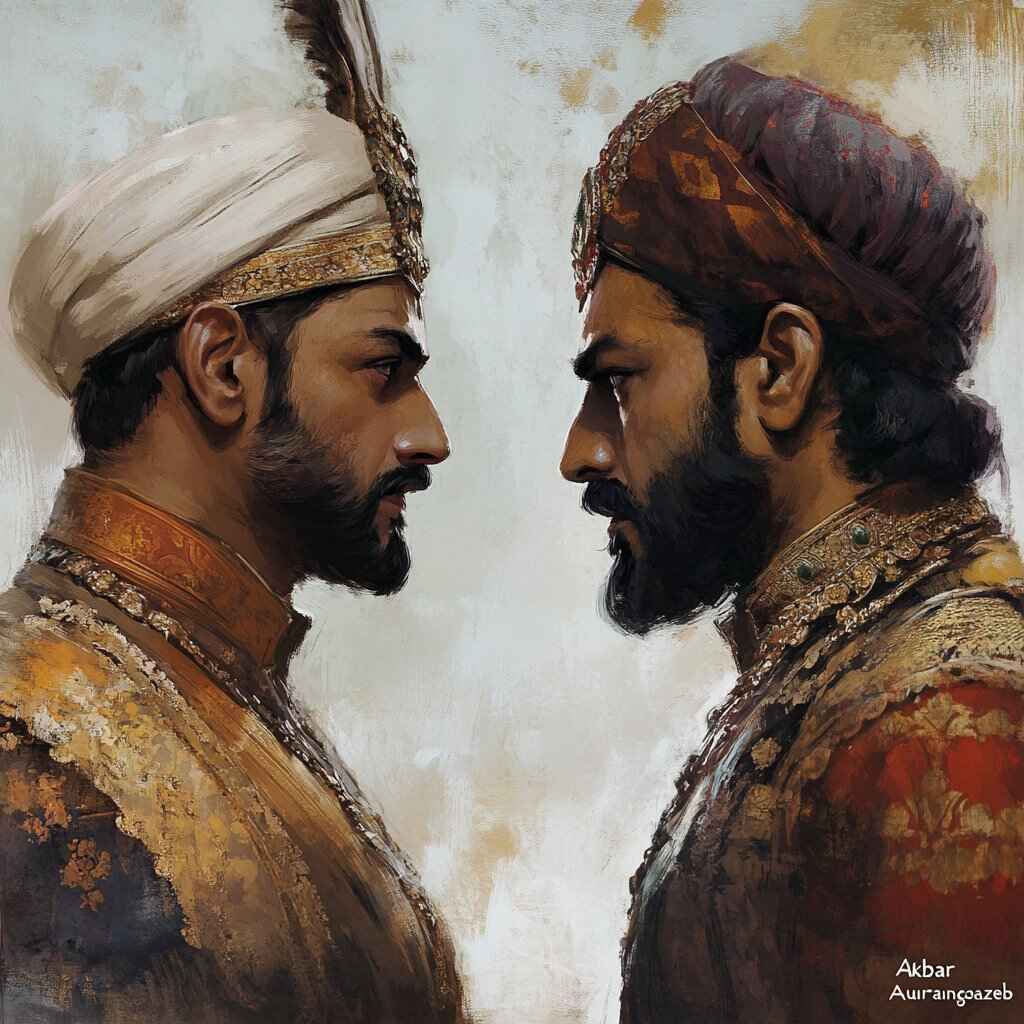In Pakistan, Aurangzeb is often hailed as the ultimate Muslim ruler—a no-nonsense king who put faith above all. Pakistani textbooks and historians celebrate his reimposition of jizya, enforcement of sharia, and construction of the Badshahi Mosque as symbols of Islamic identity. For a nation founded on religious unity, Aurangzeb’s orthodoxy resonates deeply. His discipline and piety are seen as a model for governance, reflecting Pakistan’s quest to define itself as an Islamic state.
Akbar, however, gets the cold shoulder. His Sulh-e-Kul policies, abolition of jizya, and banning of cow slaughter (a nod to Hindu sentiments) are viewed as pandering. His Din-i-Ilahi experiment is often dismissed as a syncretic flop, diluting Islamic purity. Pakistan’s narrative frames Akbar as a ruler who compromised faith for power, a stark contrast to Aurangzeb’s unwavering conviction.

India: Akbar as the Secular Hero
In India, Akbar is the golden boy of Mughal history, celebrated as a symbol of secularism and unity. His inclusive policies—marrying Rajput princesses, celebrating Hindu festivals, and fostering interfaith dialogue—are highlighted in textbooks as a model for India’s diverse society. Fatehpur Sikri stands as a testament to his architectural genius, and Bollywood’s Jodhaa Akbar romanticizes his reign as a golden age of harmony.
Aurangzeb, on the other hand, is often cast as the villain. His temple destruction, execution of Guru Tegh Bahadur, and reimposition of jizya are seen as acts of intolerance, clashing with India’s secular ethos. Indian narratives blame his endless Deccan wars for bankrupting the Mughal Empire, setting the stage for British colonial rule. Aurangzeb’s legacy is frequently invoked as a cautionary tale against religious extremism, while Akbar’s is held up as a blueprint for coexistence.
History as a Mirror: Why the Divide?
The contrasting views of Akbar and Aurangzeb aren’t just about historical facts—they reflect how India and Pakistan use history to shape their national identities. India’s secular narrative, rooted in post-independence ideals, elevates Akbar’s pluralism as a model for unity in diversity. Pakistan, founded as a homeland for Muslims, finds Aurangzeb’s orthodoxy more aligned with its Islamic ethos. These emperors, who ruled the same subcontinent, became symbols of two divergent paths after partition.
Yet, their legacies are more connected than they seem. Both faced the challenge of ruling a diverse empire, and their policies—Akbar’s inclusivity, Aurangzeb’s rigidity—were responses to that reality. Akbar’s zabt revenue system laid the foundation for Mughal prosperity, while Aurangzeb’s tax hikes to fund wars sparked unrest. One built cultural bridges; the other drew hard lines. But both left behind architectural marvels—Fatehpur Sikri and the Badshahi Mosque—that still stand as testaments to their reigns.
Beyond the Face-Off: A Modern Reflection
The Akbar-Aurangzeb debate reminds us that history isn’t just about what happened—it’s about how we choose to remember it. In 2025, as India and Pakistan navigate their modern identities, these Mughal emperors continue to serve as mirrors for national values. But perhaps it’s time to move beyond polarized narratives. Modern historians urge us to see Akbar and Aurangzeb in context: two rulers shaped by their times, each with strengths and flaws.
Akbar’s inclusivity didn’t erase his military brutality, and Aurangzeb’s orthodoxy didn’t negate his administrative skill. Their face-off isn’t just a clash of emperors—it’s a clash of ideas that still echoes across borders. So, who was the “better” Mughal? That depends on who’s telling the story.
A Question of Faith: The Sharif of Mecca’s Rejection
Aurangzeb’s religious zeal, while admired in Pakistan, wasn’t universally praised. Some historical accounts suggest that the Sharif of Mecca, the custodian of Islam’s holiest city, was skeptical of Aurangzeb’s motives. Aurangzeb sent lavish gifts to Mecca to bolster his image as a pious ruler, but whispers persist that the Sharif rejected his overtures, questioning his harsh policies. If Aurangzeb was so religious, why did even the Sharif of Mecca reportedly turn him away? This debated snub adds a layer of complexity to Aurangzeb’s legacy, challenging the narrative of him as the ultimate Islamic king.
